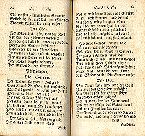
Title page
55 Kb (Jpeg)

Auferstehn, ja auferstehn
79 Kb (Jpeg)

Antiphonal hymn
170 Kb (Jpeg)

Klopstock, Friedrich.
Friedrich Klopstock's Geistliche Lieder. Erster Theil
Copenhagen and Leipzig, 1758
A poet of the German Enlightenment and member of the so-called "Berlin School," Friedrich Klopstock (1724-1803) made clarity of expression the primary goal in his pious and devotional writings. Part of his program advocated rewriting many of the old chorale texts, ridding them of irregular metric structures and rhyme schemes, ambiguous or unintelligible expressions, and the strident language of early Protestantism or the erotic sentiments of the Pietists. In the Geistliche Lieder the remodeled chorales are found at the conclusion of the book.
The new texts by Klopstock and the poets of the Enlightenment expressed an optimistic view of the world and man, especially when compared to those from the sixteenth and seventeenth centuries. In their writings, these eighteenth-century poets also frequently spoke of their hope for resurrection and of meeting again in the life hereafter. Perhaps one of the most famous hymns in this book, one illustrative of the resurrection theme, is Klopstock's "Auferstehn, ja auferstehn wirst du." Carl Heinrich Graun set it to music in 1758, and, for a long time thereafter, it remained a hymn frequently used at funerals.
A third feature of the Geistlich Lieder is the number of hymns that are marked for antiphonal singing. In the preface to the book, Klopstock strongly advocated the alternation of choir and congregation in hymn singing. He considered it an excellent way of incorporating expressions of adoration into the liturgy.
|
Grace Doherty Library Centre College Danville, KY |
September 1, 1999 |